Leadership teamRōpū ārahitanga
The SfTI Leadership team comprises of a Director and nine Leadership team members. Each member has an area of expertise, or theme that they lead.
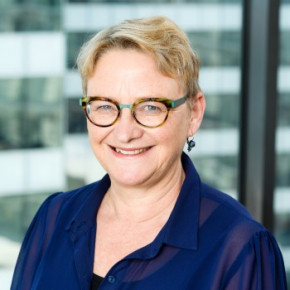
Professor of Management at Victoria University Business School, and former Commissioner with the New Zealand Productivity Commission (2011-March 2020), Sally’s academic life began as a research chemist.
An Emeritus Investigator with the MacDiarmid Institute for Advanced Materials and Nanotechnology, Sally is also a Principal Investigator with Te Pūnaha Matatini, which develops methods and tools for transforming complex data into knowledge.
With research interests covering the commercialisation of scientific research, entrepreneurship and the growth of high-tech firms, innovation strategy and policy, Sally has led research grants covering projects on competitive advantage in New Zealand firms, and sustainability and firm-level productivity in our biotechnology and food and beverage sectors.
Sally is also an Adjunct Professor in the College of Business and Economics at the Australian National University, a Fellow of the International Society for Professional Innovation Management, and a member of Global Women.
DDI: +64 4 463 5144
Sally Davenport MNZM
Director
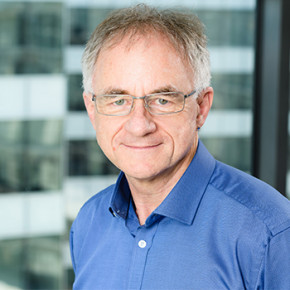
Bruce leads the Sensors, robotics and automation research theme, and oversees Capacity Development initiatives.
With a long-term goal of designing intelligent robotic assistants that improve people’s quality of life, his primary research interests are human-robot interaction, robot programming systems, and their application in areas such as healthcare and agriculture.
Director of Auckland University’s Centre for Automation and Robotic Engineer Science, Bruce also chairs the New Zealand Robotics, Automation and Sensing Association, and co-chairs the Institute of Electrical and Electronics Engineers technical committee on software engineering for robotics.
DDI: +64 9 923 8157
Bruce MacDonald
Deputy Director and Theme Leader - Sensors, Robotics and Automation
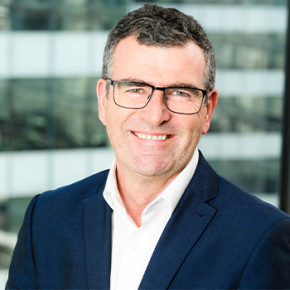
Stephen is Professor of Software Engineering and Director of the Software Engineering Research Laboratory (SERL) at Auckland University of Technology, and Otago University Professor in Information Science. With a particular interest in understanding how software teams work, his research is focused on software analytics and their visualisation, and how these can enable improved decision-making regarding practice selection, work planning, forecasting and management.
He is a Fellow of IT Professionals NZ, Senior Member of the Institute of Electrical and Electronics (IEEE) and the IEEE Computer Society, a Member of the ACM, and serves on the Editorial Board of Information and Software Technology. Stephen is also a Technical Advisor to the Office of the Federation of Māori Authorities Pou Whakatāmore Hangarau and Chief Advisor Innovation and Research, and Deputy Chair of Software Innovation New Zealand (SINZ).
DDI: +64 9 921 9999
Stephen MacDonell
Deputy Director and Theme leader - Data Science and Digital Technologies
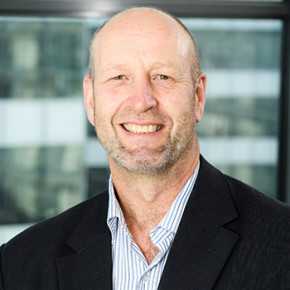
Professor at Massey University’s School of Engineering and Advanced Technology since 1993 and Head of School from 2008 to 2017, Don’s research interests include industrial refrigeration, heat pumping, energy efficiency and food processing.
Don is a founding member of Massey’s Postharvest and Refrigeration Research Centre which undertakes research, consultancy and education to support the food cold chain and focusses on packaging, horticultural crops, energy and sustainability.
A MacDiarmid Institute Director, he is a former Vice-President of the Science and Technology Council of the International Institute of Refrigeration.
DDI: +64 6 350 5240
Don Cleland
Theme leader - Materials, Manufacturing and Design
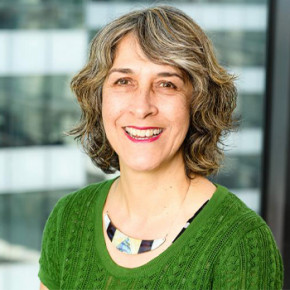
Before joining Otago University in 2008, Katharina’s early career included teaching in management roles, as well as five years as education manager and project consultancy with Te Rūnanga o Ngāi Tahu.
Katharina joined Otago University's Dean's Office in April 2017 to provide leadership and strategic advice to the Business School on the University’s Māori Strategic Framework.
Her roles within SfTI include leading Vision Mātauranga in the Challenge’s Building New Zealand’s Innovation Spearhead project, in Kāhui Māori and as a senior management team member. Katharina's research focuses on innovation and Māori business, including developing science capacity to respond to the growing Māori economy.
katharina.ruckstuhl@otago.ac.nz
DDI: +64 3 479 4916
Katharina Ruckstuhl
Ngāi Tahu, Rangitāne
Theme Leader - Vision Mātauranga, and Co-Theme Leader - Building New Zealand’s Innovation Capacity
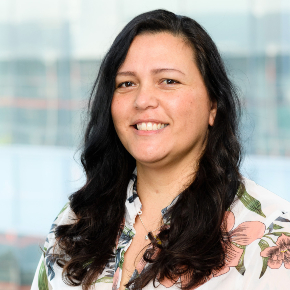
Before joining Victoria University’s Centre of Science in Society as a Senior Lecturer, Pauline Harris’s research interests focussed on gravitational microlensing, gamma ray bursts, high-energy neutrino production and inflationary cosmology.
Having focussed on physics in her early career, Pauline is now focussed on mātauranga Māori associated with Māori astronomy, traditional Māori calendars called Maramataka, climate change and sustainability. Pauline has been involved with the revitalisation of Māori astronomical knowledge for over 20 years and is currently the Chairperson of the Society of Māori Astronomy Research and Traditions (SMART).
Pauline also is part of the MacDiarmid Institute as a Principal Investigator and is on the Science executive.
Pauline’s role at SfTI is to provide support and oversight to our aims, aspirations and implementation of Vision Mātauranga, and to support Maori researchers, communities and iwi to unlock the science and innovation potential of their knowledge, resources and people.
p.harris@massey.ac.nz
Pauline Harris
Rongomaiwahine, Ngāti Rakaipaka and Ngāti Kahungunu ki Wairoa
Theme Leader - Vision Mātauranga
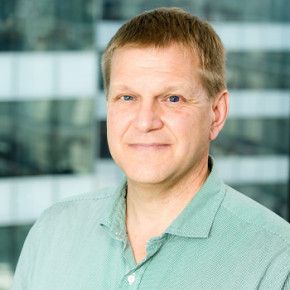
A Reader in Management at Victoria University of Wellington Business School, Urs’ research interests focus on value creation and capture, and drawing on the resource-based and capabilities views of firms. His emphasis is on strategic research and development and innovation decision-making.
Urs has been a member of research teams examining New Zealand firms’ competitive advantage, and identity and identification in the MacDiarmid Institute. He was also involved in the former Industrial Research Limited’s ‘What’s Your Problem New Zealand’ Challenge.
In part to Urs's SfTI leadership role, he is also the co-leader Spearhead project: Building New Zealand's Innovation Capacity.
DDI: +64 4 463 5732
Urs Daellenbach
Co-Theme Leader - Building New Zealand’s Innovation Capacity
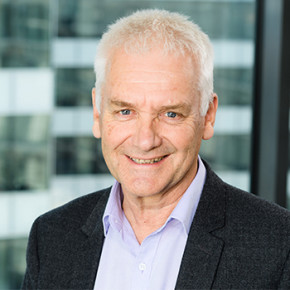
Ian brings SfTI 30 years’ experience leading research and development projects, with a focus on agricultural and environmental sector sensors.
His background in theory and propagation of electromagnetic fields, time domain reflectometry, high-speed electronics, and a general understanding of soils, contaminant flow, and agricultural practice, is being applied to SfTI’s agricultural and environmental technologies research.
Ian also leads the Spearhead project: Inverting electromagnetics – a new way to measure groundwater flow.
ian.woodhead@lincolnagritech.co.nz
DDI: +64 3 325 3721
Ian Woodhead
Theme Leader - Agricultural and Environmental Technologies
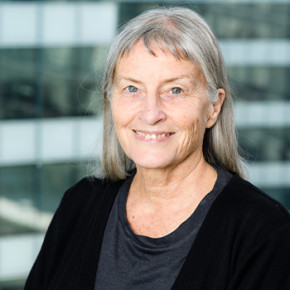
As SCION's General Manager, Manufacturing and Bioproducts for 14 years (2006-20), Elspeth led over 100 staff involved in wood and fibre processing activities including biorefinery, biochemicals, bioplastics, clean technology and biotech/omics activities. On the Board of BPN Ltd and the NZ Packaging Council, Elspeth also has a governance/advisory role for the Bioprocessing Alliance and NSC BBHTC.
With extensive international experience in the bioeconomy research community, Elspeth belongs to the International Advisory Council for the Global Bioeconomy Forum, was an EU Biorefinery roadmap to 2030 reviewer, and a member of a government Futurewatch group. In 2003 she completed a future scenario on industrial biotechnology for the OECD, and is a regular speaker at international and local events.
Elspeth is Independent Owner of Bioeconomy Futures and oversees the SfTI Spearhead project: Additive manufacturing and 3D and/or 4D printing of bio-composites
Mobile: 021 529 313
Elspeth MacRae
Theme Leader - Materials, Manufacturing Processes and Applications
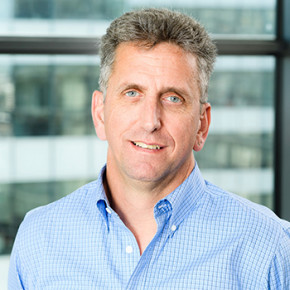
Distinguished Professor in Mechanical Engineering and Director of Mechatronics at Canterbury University, Geoff is a Fellow of the Royal Society of New Zealand, the American Society of Mechanical Engineers, and Engineers New Zealand.
Geoff’s focus within SfTI is the research and application of model-based therapeutics that improve care, save lives, and reduce cost. As part of this role, Geoff also leads the Spearhead project: Home and community based care – Type 2 diabetes.
A NZ Consortia for Medical Device Technology management board member, Geoff is Deputy Director of the MedTech Centre of Research Excellence, and leads the EU-NZ eTIME clinical bio-engineering consortia. He has founded two MedTech venture-funded startup companies based around model-based therapeutics and novel breast cancer screening technology.
DDI: +64 3 369 2182
Geoff Chase
Theme Leader - Medical Technologies